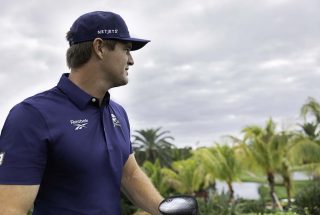National and Local Golf Industry Leaders Gather to Discuss Economic, Environmental and "Human Impact" of Golf
RICHMOND, Va–Virginia Gov. Tim Kaine proclaimed Tuesday, May 15, 2007, as "Play Golf Virginia Day," the result of an economic impact survey commissioned by the Virginia Golf Council. The proclamation, presented by the Governor’s Chief of Staff, Bill Leighty, heralded the economic significance of golf in the Commonwealth relative to employment in the state, its impact on hospitality, tourism, and real estate; and its environmental stewardship and green space preservation.
The independent study, commissioned by the Virginia Golf Council and conducted by SRI International, revealed that the direct, indirect and induced economic impact of golf in the Commonwealth is $3.1 billion annually. The golf industry employs more than 40,000 and provides positive environmental impact in the state.
At a luncheon to discuss the study and its importance were key golf industry leaders including David Fay, Executive Director of the United States Golf Association; Ruffin Beckwith, Executive Director of GOLF 20/20 and also representing the PGA Tour; Joe Steranka, CEO of The PGA of America; Libba Galloway, Deputy Commissioner of the LPGA; Steve Mona, CEO of the Golf Course Superintendents Association of America; Mike Hughes, Executive Director of the National Golf Course Owners Association; and James Singerling, CEO of the Club Managers Association of America.
In addition to Leighty, key Virginia legislators and officials from the Governor’s office in attendance included Delegate Franklin Hall, Senator Yvonne Miller, Senator John Watkins, and Virginia’s Secretary of Commerce and Trade, Patrick Gottschalk.
The national leaders of the industry each spoke briefly and all applauded Virginia for its insight and initiative to bring together its allied golf organizations to create the Virginia Golf Council. Those allied organizations are the Virginia State Golf Association; the Virginia Golf Course Superintendents Association; the Virginia Turfgrass Council; the Virginias Chapter of the Club Managers Association of America; and the Middle Atlantic Section of The PGA of America.
Singerling said that "the industry is in an enormous transformation and the time for allied agencies to work together is not in troubled times and times of confrontation but in times when we can build relationships and strength — working together for a common good."
Beckwith said that the idea of conducting economic impact studies for golf in each state was borne following the aftermath of Hurricane Katrina’s devastation in the fall of 2005. "Other industries were receiving tax relief following Katrina but not golf," he said. "Had Louisiana and Mississippi had such a study and shown the value of golf as a significant economic engine, then possibly the industry could have had a greater impact on legislative decisions in that area."
Virginia is the first state to conduct this type of study and the Virginia Study is being used as a template for other states. Steranka praised Virginia for being a "pioneer" in being the first to conduct the study.
"We no longer have anecdotal evidence of golf and its economic impact but now we have facts," said Steranka. "This study is a landmark for Virginia and the industry."
Fay added that golf "is an extraordinary asset in the Commonwealth both economically and environmentally, while also improving the quality of life for the citizens of the Commonwealth." At the same time, he stressed that the golf industry "can’t assume the health of the game. Other sports and activities are competing for our participants and by focusing on long-term planning, we can protect our golf base and make it stronger."
Many of the leaders talked about the hurdles of the game in today’s society relative to the time commitment, the expense, the difficulty of the game, lack of golfer diversity and exposing children to the game. Hughes said that "today’s society no longer thinks in four- to five-hour increments, as our parents did. We now think in increments of two hours or less. America has changed and golf needs to change. We, as an industry, need to be mindful of this and offer golf in a way that people want to consume it."
Hughes added that barriers for women and minorities need to be lowered to encourage participation. Steranka discussed the success of The First Tee initiatives for introducing young people to the game of golf and the values associated with the game and also talked about The PGA of America’s national initiative, Play Golf America, to encourage increased participation, with the support of many national allied golf organizations.
Beckwith added that golf "is now being added to many physical education curriculums in elementary schools and exposing thousands of children to the game."
Much discussion was also given to the positive environmental impacts of golf. Mona noted that "The No. 1 environmental concern is water. Water quality and availability are critical to the economic health of the game. Golf is an efficient consumer of water, using significantly less water than other industries in the Commonwealth while generating dramatically higher revenues per acre than other industries." The Golf Course Superintendents Association of America, with the help of its chapters, is collecting data on golf courses to develop programs and resources that will further enhance golf’s compatibility with the environment.
The group actively discussed the economic and environmental impact of golf but also discussed the "human impact" of golf. Beckwith highlighted part of the study outlining that golf has generated approximately $20 million dollars in charitable giving in Virginia in 2005.
Galloway added: "The LPGA has contributed more than $180 million to charities in the past 25 years and the event in Williamsburg alone has contributed more than $1 million to Virginia charities in its four-year tenure. From PGA Tour to LPGA tournaments to local fundraisers, golf is supporting charities all across America."
"Golf is one of the most sustainable industries in our communities," said Singerling. "Golf is a good neighbor not only economically and environmentally but it also teaches life skills to our young people. Golf is a friend to all that it touches not only to a select few."
For a copy of the complete study visit the Virginia Golf Course Superintendents Association at www.vgcsa.org.
Editors Note: PHOTOS FROM GOLF DAY IN VIRGINIA , MAY 15, 2007 IN RICHMOND, VA. in attachment: Front row (l-r): United States Golf Association Executive Director David B. Fay, PGA of America Chief Executive Officer Joe Steranka, National Golf Course Owners Association Executive Director Mike Hughes. Back row (l-r): Club Managers Association of America Chief Executive Officer James Singerling, Golf 20/20 Executive Director and Senior Vice President, World Golf Foundation PGA TOUR Ruffin Beckwith, Golf Course Superintendents Association of America Chief Executive Officer Steve Mona and Middle Atlantic Section of the PGA of America President Bob Baldassari, PGA.
Contact:
Jon Guhl, MAPGA
540/720-7420
jguhl@pgahq.com



